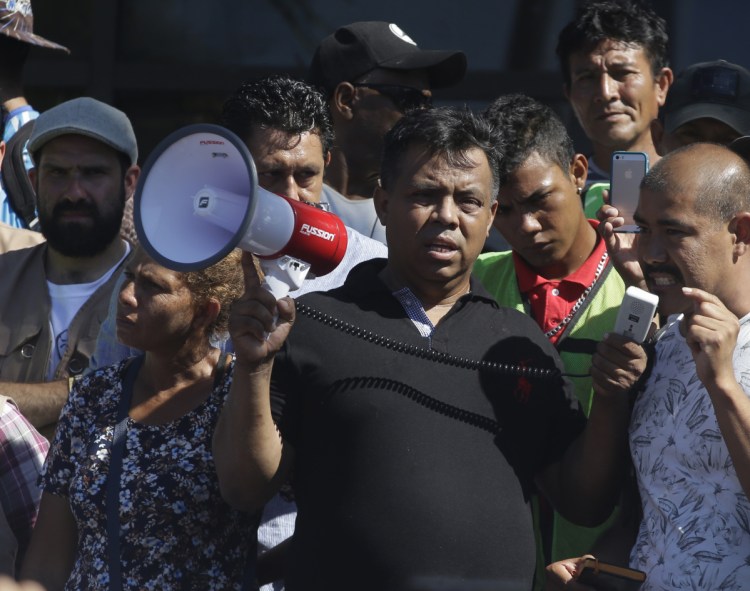TIJUANA, Mexico — Thousands of Central Americans journeying toward the United States were 2,500 miles from their destination in October when they reached a moment of decision: Should they press on toward the U.S. border? Or should they stop and put down roots in Mexico, where the government offered to let them stay?
Pueblo Sin Fronteras, a group of activists escorting the caravan, warned the migrants that the offer might be too good to be true and called a voice vote on whether to continue.
“Let’s keep going!” the crowd yelled amid applause.
And they kept going. Thousands are now in Tijuana on the U.S. border, where they are likely to be camped for months or longer with no easy way to get into the United States, creating what is fast becoming a humanitarian crisis in this overwhelmed city.
Many blame Pueblo Sin Fronteras, or People Without Borders, made up of about 40 U.S. and Mexican activists.
Critics, including former allies and some of the migrants themselves, say Pueblo Sin Fronteras downplayed the dangers of such treks, especially for families and small children, and misled the participants about how long they would have to wait on the Mexican side to apply for asylum.
Adelaida Gonzalez, 37, of Guatemala City, who joined the caravan with her 15-year-old son and neighbor, said that now that she is in Tijuana, she wishes she had accepted Mexico’s offer to stay and work in the southern Mexican state of Chiapas.
“We were never told along the way that it would be this hard,” said Gonzalez, after seeing the border wall topped with razor wire and the long waiting list for asylum seekers.
A Pueblo Sin Fronteras leader, Irineo Mujica, emphatically rejected the criticism.
“Our commitment first and foremost was protecting the lives of migrants and giving them as much information as possible,” Mujica said. “To blame the people who are helping is crazy.”
Pueblo Sin Fronteras founder Roberto Corona said in the organization’s defense that attorneys along the way told the migrants they could be held in U.S. detention centers for months and possibly separated from their children. In the end, he said, the migrants – many of whom are fleeing poverty and violence in Honduras, El Salvador and Guatemala – made their own decision.
“They know the wall is very big, and they will not be very welcome in the U.S. by many people,” Corona said, “but still they have hope of coming here, that at least their rights will be more protected, and they will be able to make a living.”
This is the fourth and biggest caravan of Central American asylum seekers that Pueblo Sin Fronteras has helped reach Tijuana, a trek that angered President Trump and prompted him to send troops to the border. When the caravan crossed into Mexico, it numbered 7,000; about 5,500 made it to Tijuana.
Pueblo Sin Fronteras maintains it simply accompanies the migrants to protect their rights. But the organization clearly plays an essential role: It helped charter the route, arrange bus transportation and negotiate with Mexican officials to provide protection. It also raised more than $46,000 online for emergency housing and food. As the caravan crossed Mexico, the group held nightly assemblies to decide the next day’s destination.
Copy the Story LinkSend questions/comments to the editors.



Success. Please wait for the page to reload. If the page does not reload within 5 seconds, please refresh the page.
Enter your email and password to access comments.
Hi, to comment on stories you must . This profile is in addition to your subscription and website login.
Already have a commenting profile? .
Invalid username/password.
Please check your email to confirm and complete your registration.
Only subscribers are eligible to post comments. Please subscribe or login first for digital access. Here’s why.
Use the form below to reset your password. When you've submitted your account email, we will send an email with a reset code.